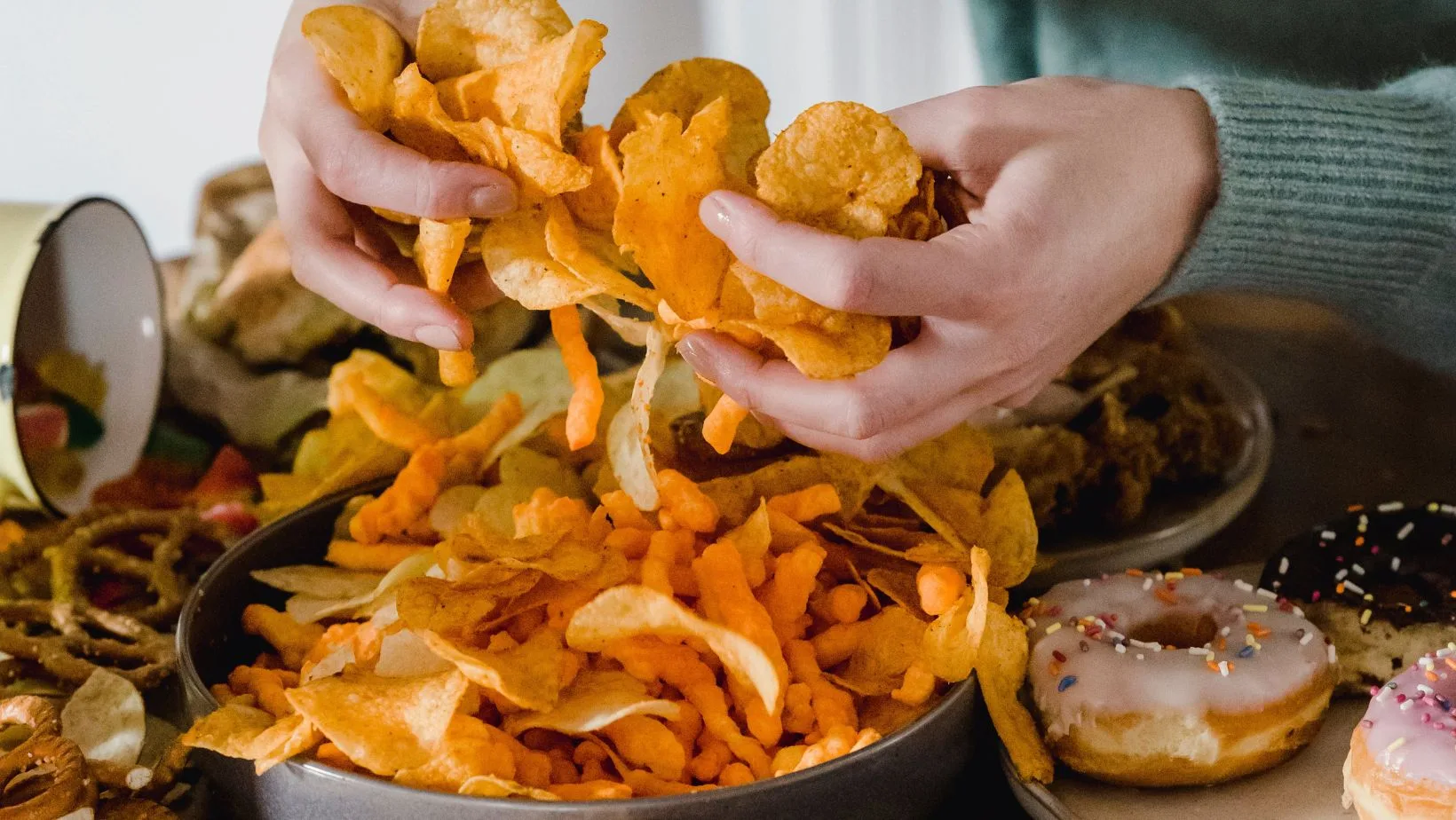Eating disorders are behavioral conditions characterized by severe and persistent disturbance in eating behaviors and associated distressing thoughts and emotions. Approximately 24 million people in the United States suffer from an eating disorder. They can be very serious conditions affecting physical, psychological and social function. There are different kinds of eating disorders- when you are eating very less (Anorexia Nervosa); When you eat a lot but constantly throw up (Bulimia Nervosa); when you overeat constantly (Binge Eating Disorder) etc. Here we are going to talk about one such eating disorder- Binge Eating Disorder (BED) and ways on how to stop binge eating.
What is Binge Eating Disorder ?
Binge Eating Disorder is a psychological disorder that occurs when you eat large amount of food in a short time. When this happens, you cannot control what the quantity of your food. While occasional eating is normal, it is is said that if you binge eat at least once a week for 3 months, you may have binge eating disorder. Episodes of binge eating are also accompanied by feelings of shame and guilt immediately after over eating.
Binge eating disorder is the most common eating disorder in the United States. About 1.25% of adult women and 0.42% of adult men have binge eating disorder. About 1.6% of teens age 13 to 18 years old are affected.
The definite cause of binge eating are unknown, however, you may have binge eating disorder, if you have experienced stressful situation, trauma, regular episodes of anxiety, family history, body image issues or feelings of low self esteem.
Buy Binge Eating recovery guides and workbooks here: https://amzn.to/47Yc2Qu
Signs and Symptoms of Binge Eating
A major sign of this disorder is having no control over eating even after being full. You may have binge eating disorder if you are experiencing some or all of the below signs and symptoms.
- Eating an usual quantity of food over a very short period of time.
- Eating even when you are not hungry or full.
- Feeling depressed, embarrassed, guilty, ashamed of overeating.
- Eating till the point of physical discomfort.
- Hoarding of food items and eating in secret.
- Frequent dieting leading to weight changes or no weight loss.
Buy Books on Overcoming Binge Eating here: https://amzn.to/48ZKtYu
How to Stop Binge Eating in 12 Ways
Binge eating can be reduced or stopped using lifestyle changes or by seeking a professional. Remember, it cannot happen over a day. Gradual and consistent changes can help reduce binge eating. Here are some of ways to stop binge eating disorder:
1. Stay Body Positive
Never forget you’re unique in your own ways. Appreciate yourself for who you are in whatever shape and size you are. If you care about what others think, I should remind you they live in the same fear of what others think about them. This means, everyone is just thinking about themselves. So go ahead and love yourself.
2. Get Rid of Dieting
Studies prove that overly restrictive eating methods can trigger binge eating. Therefore, instead of trying out diets, focus on eating healthy. You can include whole grains, fibre, proteins, fruits and veggies to your favourite dishes to make them interesting. Try to avoid unprocessed and high sugar foods and liquids. Remember, having a health disease-free body is more important than any weight loss.
3. Identify Your Triggers
Identity the reasons behind your binge eating habits. Is there an underlying emotion behind it? Are you stressed, anxious , worried or nervous about something? Is it due to boredom or not wanting to do anything else? You also need to identify when it happens. Note down every time you crave to binge eat and make sure to not eat. The idea is to sit with these emotions but not eat.
4. Distract Yourself

Binge eating occurs when you cannot think about doing anything else. The next time you crave to binge eat, do anything else that you like but not eat. Take a walk outside, play a game, spend time in nature, listen to music, pick up your phone and call someone or take up a hobby. This will distract your brain to do other things instead of eating.
5. Support System
Identify people around you – be it your friends or family members whom you can empty your heart out to in difficult times. These are the people who will help you get over your binge eating and handle your mood swings. A good social support system is thought to reduce the impact of stress, which may help decrease your risk of other coping habits like emotional eating.
6. Portion Control

Over the years, portion sizes of food have drastically increased. Restaurants and fast food giants have increased food portions that have led people to eat past their hunger limits. This habit has given rise to a number of diseases such as obesity, chronic illness etc. Make sure to calculate your food portion with calorie intake needed for a day. You can also try putting your food in smaller plates to see what works for you. If eating out, ask for half a size of portion and avoid upgrading any meal to supersizes. Remember, it might be cheaper in money but is more expensive to your body.
7. Exercise
Trust me on this, exercise helps your mental health. It takes a whole lot of effort to hit that gym, but once you’re back you will feel nothing but grateful. Choose the right exercise for yourself, one that you will be consistent at- cardio, gym, weight training, swimming, Zumba, yoga etc. Start with 40 minutes a day and you will see a difference. Exercises might or might not impact your weight loss, but they definitely impact our thoughts and feelings. When you exercise, you want to eat healthy so that those burnt calories don’t go waste. This will help you control your binge eating.
8. Drink Lots of Water

Staying hydrated not only curbs binge eating but also is beneficial for your overall mental and physical well being. It is often said to drink 1 glass of water right before your meal so it fills your stomach and reduces extra calorie intake. Another tip is to replace your sugary drinks with water. Drinking water is proven to work effectively for losing weight in a healthy manner.
9. Keep A Food Journal

Make a habit to start journaling what you eat in a day. This can also be accompanied by incorporating your feelings every time you eat and every time you craved but did not eat. Such food and mood journals can help in managing your weight and health in the long run. You can also keep the journal as a reference book for coming back later on how you dealt with food cravings and binge eating before. You could also note down the nutrients present in each of the meal you ate and appreciate yourself for helping your body.
Buy Food Journals here: https://amzn.to/47W6CFz
10. Regular Meal Plan
Make sure to have 3 meals everyday in order to control your appetite. Skipping meals can actually contribute to increased cravings and overeating. Another essential tip is to never skip breakfast. Starting your day with a healthy and fulfilling breakfast reduces chances of binge eating all throughout the day.Take an hour every weekend to plan meals for the week. Make sure that all your meals have enough amount of carbs and proteins to make sure that you get enough energy to get through the day. You can even add these nutrients into your favourite dishes for make them healthier. Now that you have planned meals for the week, make sure to clean out kitchen of anything unhealthy, processed, excess in sugar. When you do not have unhealthy snacks at your arm length, you are less likely to binge eat.
11. Mindfulness
Mindfulness is a process of paying attention to your thoughts and feelings. You can take up any mindful activity such as yoga, meditation, breathing exercises etc. And set aside few minutes everyday to understand your emotions behind binge eating. Mindfulness also helps in training your brain in looking at the present moment instead of past or future and reduce anxiety, depression or fears. You can also practice mindful eating where you eat slowly, take small bites, chew slowly while being aware of food through all your senses. Such a practise will help you eat only till you’re hungry.
12. Psychotherapy and Guided Self-Help

Psychotherapy or talking to a therapist can help you cultivate healthy habits and reduce binge eating. During guided self-help, you will given self-help books, videos , internet programs to use at home. You can opt for Cognitive Behavioral Therapy (CBT) where you will learn to change your thinking and behaviour in order to start eating healthy. You can also choose Interpersonal Therapy (IPT) that will help you get into a better relationship with others around you and reducing your stress . In addition to these, your therapist might prescribe you medications to reduce the symptoms of binge eating disorder.
Recovery from Binge Eating Disorder
Recovering from Binge Eating Disorder can be challenging and may require tons of will-power. Remember, recovery is a process, it doesn’t happen overnight. Therefore, it is important to be kind to yourself. You may also discover mood swings during this process, but as long as you take one steady step at a time, you will reach there. I also believe that the recent exposure to social media with certain stories and reels on people eating delicious looking foods may trigger a sense of temptation in all of us. However, it is to be noted that social media glorifies everything, even your food. If you ever heard about food photography and what you see in food commercials , you would know that half of the food looking delicious out there is not even edible! People eating at fancy places in all their reels does not necessarily mean that they eat out all the time, some of them are on diets and are only eating for cameras. What I mean to say is what you see on social media is not their entire life, so stop comparing your body, your lifestyle etc and make your own judgement. Only you know best for your body and your mental health.
Related Reads:
7 Best Foods for Anxiety and Depression

